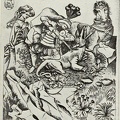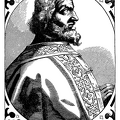What is to be done? Nothing could be more inconvenient. Easter-time, and so much new music to be played!'
Master Frank Haydn, Master of the Orchestra at the parish church of Hamburg, in Southern Germany, all but tore his brown wig in his despair, at hearing of the death of the man who played the kettle-drum in his orchestra.
'I know of no one to take his place at such short notice,' he went on, though there were only his wife and little nephew to hear him.
The nephew, Joseph Haydn by name, had only lately come into the choir-master's family. He was a child of six years old, but had already shown such wonderful musical genius, that his parents had decided to place him with his uncle, where he would have great opportunities for musical study.
The little fellow now looked up from an old music book, for he could read music perfectly, and said timidly, 'I think I could manage the kettle-drum, uncle, if you would just show me a little how it should be played.'
'You, Joseph?' said the choir-master in surprise, as he looked down at the serious little face. 'It is not a violin, you know; if it were you could manage well enough, but you know nothing of kettle-drums.'
'Let me try, Uncle!' pleaded Joseph. Before long he had his wish, and both were in the big room over the church porch where the practices always took place.
Joseph's little fingers seemed to hold the drum-sticks as if to the manner born, and after a short rehearsal of the music to be played on the festival, the old man felt an immense load lifted off his shoulders.
'Capital! capital!' he exclaimed. 'I shall not miss poor Schmidt now; your touch is crisper than his!'
Then the door of the room was locked, and uncle and nephew returned home.
Joseph, however, as Easter drew near, became very anxious, and longed for an opportunity for further practice on the drum. His fingers might not be skilful enough: he could be sure of the notes without practice, but could he handle the sticks properly? He dared not ask his uncle for leave to go into the choir-room, and he had no drum in the house. What could he do? Practise he must, or he would never feel sure of himself.
'I will make a drum!' said the little fellow; 'I have an idea.'
There was a round basket in the out-house. It was generally used for flour, but it happened to be nearly empty now, and Joseph seized on this, as it was the shape of a drum; over it he stretched a clean dishcloth, fastening it as tightly as possible with string.
'It makes a beautiful drum!' he said joyfully, as he beat it with two sticks, and carrying his 'drum' into the parlour, he placed it on a chair, propped the music up in front of him, and practised the fingering diligently and noiselessly for an hour or more, till he felt quite sure of himself.
Alas, for Joseph, however! He had been too absorbed in his drumming to notice the small quantity of flour which had been left in the basket. It was shaken out with each beat of the drum-sticks, and now lay thick on the velvet cover of the chair. Joseph got a whipping for his thoughtlessness, but that was nothing uncommon for children in the eighteenth century, and was soon forgotten.
Easter arrived, and the little fellow played his drum so well, that for many years after he played that instrument in the choir.
- Author
- Chatterbox, 1906
Available from www.gutenberg.org - Posted on
- Sunday 27 December 2020
- Dimensions
- 828*975
- Visits
- 1623
- Downloads
- 50
 Download Photo
Download Photo





